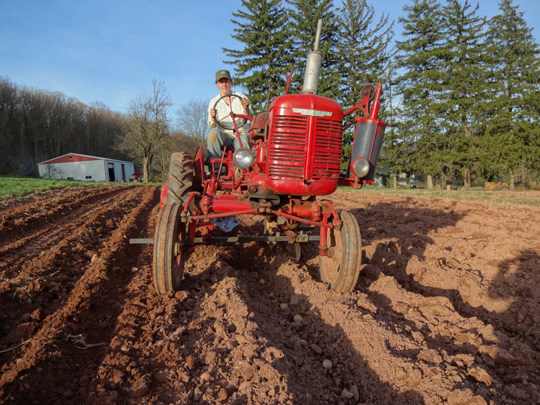by Sara Schwartz
Sara Runkel, who manages Great Bend Farm, says PA-WAgN allows women to find mentors to connect with. | Courtesy Sara Runkel
The Pennsylvania Women’s Agricultural Network aims
to elevate, support women who farm
In the past 40 years, the number of women in the U.S. recognized as a farm’s principal operator—the person running the show—has more than doubled. This is progress.
Though the numbers have grown, women still make up just under 14 percent of the overall number, and continue to face issues most male farmers do not. There can be expectations within the family about managing childcare, or the struggles of working with equipment designed for men. And then there are the hard-to-pin-down disadvantages that result from being part of a minority that may not be taken seriously by some. To address this, the Pennsylvania Women’s Agricultural Network (PA-WAgN) was formedby a group of women farmers and Penn State researchers in 2005, working to support, educate and empower the women who wish to farm.
Patty Neiner, the educational program associate of PA-WAgN, says there are over 1,600 people who have joined the organization. She and her partner, Lyn Garling, run Over the Moon farm in Centre County, Pennsylvania, and were part of the founders in 2005. Neinerrecommends that any woman considering a career in farming take advantage of the support system and camaraderie that PA-WAgN offers.
“Many states have organizations similar to PA-WAgN, women should find an organization close to them and get involved right away if they are interested in farming at any scale,” Neiner says.
Sarah Edmonds, the Metzgar Environmental Projects Coordinator and Manager of LaFarm, one of several sustainability initiatives at Lafayette College, adds to Neiner’s advice.
“Find someone who can be a mentor, so you just don’t get into a farm job,” she says. “Try to find a farm internship, one day a week, to see if you like it. Be selective, try to find someone with the same values.”
Edmonds has been an active member of PA-WAgNfor three years and places a high value on the support it provides: “I get to go to the networking events, field walks, breakfasts, community dinners—which is awesome.”
Sara Runkel, who manages Great Bend Farm in Port Clinton, Pennsylvania, joined PA-WAgNin 2011 and volunteers on the steering committee. She cites an issue that hit home with her last year—balancing working on a farm with family life.
“We just had a kid in April, and it has been quite the challenge to navigate being the primary farmer and a new parent,” she says. “There are ways to make it work. I think a big part of that is having a supportive network and mentors you can connect with, people who can help you through some of the challenges you might face balancing family life and running a farm.”
Beyond that, she adds that many people might not realize that a lot of farm equipment is designed for men—making it difficult or even unsafe for women to operate. “I think there’s an opportunity for education for women farmers around how to use equipment safely for their bodies for long-term use,” she says, adding that some equipment requires a certain weight on the seat to run it. “And maybe being able to pick and choose from equipment that will do the thing you need it to do, but is easier to manage if you don’t have the upper body strength to wrestle things around.”
But Runkel says this shouldn’t discourage anyone. “If what your passion is, is growing food, you can do it. You can be the one out on the tractor running the farm.”



